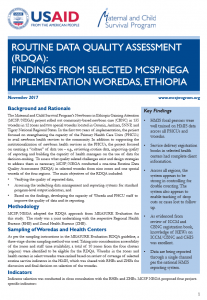
The Maternal and Child Survival Program’s Newborns in Ethiopia Gaining Attention (MCSP/NEGA) project rolled out community-based newborn care (CBNC) in 135 woredas in 12 zones and two special woredas located in Oromia, Amhara, SNNP , and Tigray National Regional States. In the first two years of implementation, the project focused on strengthening the capacity of the Primary Health Care Units (PHCUs) to avail newborn health services to the community. In addition to supporting the institutionalization of newborn health services in the PHCUs, the project focused on creating a “culture” of data use – e.g., reviewing routine data, improving quality of reporting and building the capacity of health managers on the use of data for decision-making. To assess what quality related challenges exist and design strategies to address them as necessary, MCSP/NEGA conducted a one-time Routine Data Quality Assessment (RDQA) in selected woredas from nine zones and one special woreda of the four regions.
The main objectives of the RDQA included:
- Verifying the quality of reported data.
- Assessing the underlying data management and reporting systems for standard program-level output indicators.
- Based on the findings, developing the capacity of Woreda and PHCU staff to improve the quality of data and its reporting.